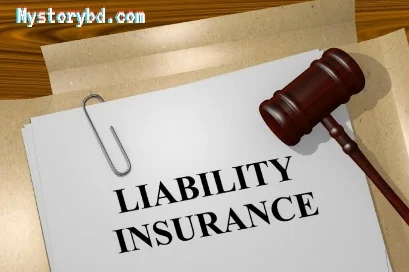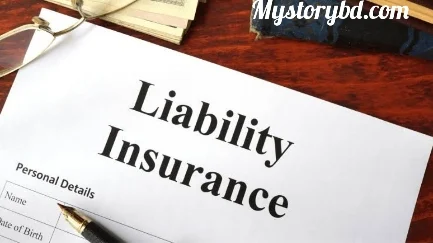What is liability insurance - Types of liability insurance
Liability insurance is a type of insurance that protects individuals and businesses from financial loss resulting from claims of injury or damage caused by the insured party. Liability insurance covers legal costs, court fees, and damages awarded to the claimant up to the policy's limits.
There are different types of liability insurance policies, including general liability insurance, professional liability insurance, product liability insurance, and directors and officers liability insurance. Each type of policy provides coverage for specific types of claims.
General liability insurance provides coverage for claims of bodily injury, property damage, and advertising injury (such as copyright infringement) caused by the insured party. Professional liability insurance, also known as errors and omissions insurance, provides coverage for claims of professional negligence or errors that result in financial harm to a client.
Product liability insurance covers claims of injury or damage caused by a product sold by the insured party. Directors and officers liability insurance provide coverage for claims of wrongful acts by directors and officers of a company.
Liability insurance is essential for individuals and businesses to protect themselves from financial ruin in the event of a lawsuit. It is important to carefully review insurance policies and consult with an insurance professional to determine the appropriate coverage needed for your specific situation.
What is liability insurance?
There are different types of liability insurance policies, such as general liability insurance, professional liability insurance, product liability insurance, and directors and officers liability insurance. General liability insurance typically covers claims of bodily injury, property damage, and advertising injury.
Professional liability insurance, also known as errors and omissions insurance, provides coverage for claims of negligence or errors that result in financial harm to a client. Product liability insurance covers claims of injury or damage caused by a product sold by the insured party.
Directors and officers liability insurance provide coverage for claims of wrongful acts by directors and officers of a company. Liability insurance is important for individuals and businesses to protect themselves from potentially devastating financial losses resulting from lawsuits or claims.
It is important to carefully review insurance policies and consult with an insurance professional to determine the appropriate coverage needed for your specific situation.
More post: Medicare insurance
Types of liability insurance?
There are several types of liability insurance available to individuals and businesses, each designed to provide coverage for specific risks and types of liability. Some of the most common types of liability insurance include:
General Liability Insurance
Provides coverage for claims arising from third-party bodily injury, property damage, or advertising injury that result from your business operations, products, or services.
Professional Liability Insurance
Also known as errors and omissions insurance, provides coverage for claims arising from alleged errors or negligence in the provision of professional services by professionals, such as doctors, lawyers, architects, or engineers.
Product Liability Insurance
Provides coverage for claims arising from injuries or damages caused by products manufactured, distributed, or sold by a business.
Cyber Liability Insurance
Provides coverage for claims arising from cyber attacks, data breaches, or other cyber risks that result in loss or damage to third parties.
Directors and Officers Liability Insurance
Provides coverage for claims against directors and officers of a company for alleged wrongful acts, such as breach of fiduciary duty or mismanagement.
Employment Practices Liability Insurance
Provides coverage for claims arising from wrongful employment practices, such as discrimination, harassment, or wrongful termination.
Umbrella Liability Insurance
Provides additional liability coverage beyond the limits of other liability insurance policies. The specific types of liability insurance that are appropriate for an individual or business will depend on the nature of the risks and types of liability they face.
It's important to carefully review your insurance needs and consult with an insurance professional to determine the appropriate types and limits of liability insurance for your specific situation.
More post: key person insurance
What does liability insurance cover?
Bodily injury
Liability insurance covers medical expenses, lost wages, and other damages resulting from injuries to a third party.
Property damage
Liability insurance covers the cost of repairs or replacement of damaged property belonging to a third party.
Advertising injury
Liability insurance covers claims of intellectual property infringement, such as copyright infringement or defamation.
Legal fees
Liability insurance covers the cost of legal defense and court fees in the event of a lawsuit or claim.
Settlements or judgments: Liability insurance covers the costs associated with settlements or judgments up to the policy's limits.
Settlements or judgments: Liability insurance covers the costs associated with settlements or judgments up to the policy's limits.
The specific coverage provided by liability insurance depends on the type of policy purchased. For example, general liability insurance typically covers bodily injury, property damage, and advertising injury, while professional liability insurance provides coverage for claims of professional negligence or errors that result in financial harm to a client.
It's important to carefully review insurance policies and consult with an insurance professional to determine the appropriate coverage needed for your specific situation.
What does liability insurance not cover in the event of an accident?
However, there are certain things that liability insurance may not cover, including:
Damage to your own property
Liability insurance typically only covers damage or injury to others, not your own property. If you want coverage for damage to your own property, you will need to purchase additional insurance, such as collision coverage.
Intentional acts
Liability insurance does not cover intentional acts, such as when you intentionally cause harm to another person or their property.
Criminal activities
If the accident occurred while you were committing a criminal act, such as driving under the influence of drugs or alcohol, liability insurance may not cover the damages.
Business activities
Liability insurance may not cover accidents that occur while you are engaged in business activities, such as using your vehicle for commercial purposes.
Non-covered parties
Liability insurance only covers damages to third parties, meaning it may not cover damages to your own passengers or to you personally.
It's important to review your liability insurance policy and understand what it covers and what it does not. If you have any questions, you should consult with your insurance agent or a qualified professional.
More post: cando insurance
What is the liability insurance coverage?
Liability insurance coverage can be purchased by individuals or businesses and is typically available in various forms, such as:
General liability insurance
Covers damages or injuries that occur on your property, caused by your products or services, or due to your business operations.
Professional liability insurance
Also known as errors and omissions insurance, covers professionals, such as doctors, lawyers, and accountants, against claims of negligence or malpractice.
Product liability insurance
Covers manufacturers, wholesalers, and retailers against claims arising from defective products.
Umbrella liability insurance
Provides additional liability coverage beyond the limits of your underlying insurance policies.
The specific coverage and limits of liability insurance will vary depending on the type of policy and the insurance provider. It's important to carefully review the terms and conditions of any liability insurance policy to ensure that it provides adequate protection for your needs.
How does liability insurance differ from comprehensive or collision insurance?
Liability insurance is designed to cover the costs associated with legal claims, including legal fees, settlements, and judgments. Comprehensive insurance is a type of insurance that covers damage to your vehicle that is not the result of a collision with another vehicle. It typically covers damage caused by theft, vandalism, fire, natural disasters, and other types of non-collision incidents.
Collision insurance is a type of insurance that covers damage to your vehicle in the event of a collision with another vehicle or object, regardless of who is at fault. The key difference between liability insurance and comprehensive or collision insurance is that liability insurance provides coverage for damages or injuries to others, while comprehensive and collision insurance provides coverage for damages to your own vehicle.
Liability insurance is typically required by law in most states, while comprehensive and collision insurance are optional and may be required by a lender or leasing company if you are financing or leasing your vehicle.
It's important to carefully review your insurance policies and understand the coverage and limits of each type of insurance to ensure that you have adequate protection in the event of an accident or other covered loss.
Advantages and disadvantages of liability insurance?
Liability insurance can provide financial protection to individuals and businesses in case they are held responsible for damages or injuries caused to others. Here are some advantages and disadvantages of liability insurance:
Advantages:
Financial protection
Liability insurance provides financial protection in case an individual or business is sued for damages or injuries. It can help pay for legal fees, settlements or judgments, and other related costs.
Peace of mind
Liability insurance gives individuals and businesses peace of mind, knowing that they have protection in case of unforeseen circumstances.
Legal representation
Liability insurance can provide legal representation in case of a lawsuit, which can be helpful, especially for those who don't have the resources to hire a lawyer.
Compliance
Liability insurance may be required by law or by certain contracts or agreements. Having liability insurance can help individuals and businesses comply with these requirements.
Disadvantages:
Cost
Liability insurance can be expensive, depending on the level of coverage and the risk profile of the individual or business.
Limited coverage
Liability insurance may have limitations and exclusions, which may leave individuals and businesses exposed to certain risks.
False sense of security
Liability insurance may give individuals and businesses a false sense of security, leading them to take unnecessary risks or not take enough precautions to prevent accidents or injuries.
Claims process
The claims process can be complicated and time-consuming, especially if there is a dispute or if the insurance company denies the claim.
Overall, liability insurance can be a valuable tool for individuals and businesses to protect themselves financially in case of unforeseen circumstances. However, it's important to understand the advantages and disadvantages before deciding whether to purchase liability insurance and how much coverage is needed.












